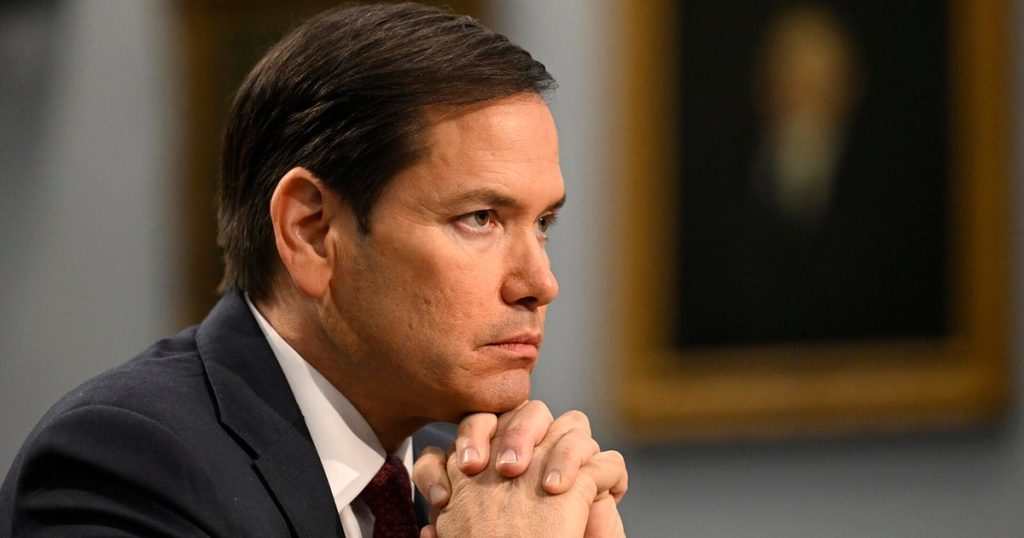The federal government is set to implement a significant policy change regarding international student visas, targeting Chinese students, specifically those engaged in critical academic fields or with ties to the Chinese Communist Party. Secretary of State Marco Rubio announced this initiative on Wednesday, revealing plans for stricter vetting processes and the aggressive revocation of existing visas. This move marks a continuation of heightened scrutiny of the relationship between U.S. higher education and Chinese influences amid ongoing political tensions.
| Article Subheadings |
|---|
| 1) Policy Overview and Implications |
| 2) Historical Context of Scrutiny |
| 3) Impact on International Students |
| 4) Reactions from Academic Institutions |
| 5) Broader Implications for U.S.-China Relations |
Policy Overview and Implications
The recent announcement by Secretary Marco Rubio outlines a concerted effort to revoke visas held by some Chinese international students. This initiative is characterized by an increased emphasis on national security and scrutiny regarding the connections those students may have to the Chinese Communist Party. The State Department, in collaboration with the Department of Homeland Security, intends to enhance the criteria for visas from China and Hong Kong, focusing on students in critical fields such as technology, defense, and other sensitive areas.
This policy shift is indicative of the Trump administration’s broader strategy to re-evaluate and restrict foreign influence in U.S. educational institutions, particularly from nations viewed as geopolitical adversaries. With China identified as the second-largest source of international students in the U.S., this change could shift the landscape of higher education significantly, potentially affecting the enrollment of upwards of 270,000 Chinese students.
Historical Context of Scrutiny
The foundations for this heightened scrutiny can be traced back to concerns about the integrity of research and educational partnerships. Recently, House Republicans urged institutions such as Duke University to reconsider their partnerships with Chinese universities, citing fears that such collaborations might grant undesired access to critical research funded by U.S. taxpayers.
A report released last year amplified these concerns, warning that millions of dollars in defense funding were inadvertently supporting research opportunities linked to the Chinese government. The implication was clear: these partnerships could provide foreign entities the opportunity for “back-door access” to technologies and information essential for national security.
Impact on International Students
This initiative, while ostensibly aimed at safeguarding national interests, introduces a wave of uncertainty for international students already facing a challenging landscape. Recent regulations had already complicated the legal status of thousands of students, often for minor infractions, leading to significant psychological and emotional strain within this demographic.
Moreover, the move to halt new student visa interviews positions these students in a precarious situation, especially as many rely on timely visa processing for their educational pursuits. The educational environment may become less welcoming, as institutions grapple with the dual pressures of supporting their student bodies while adhering to national policy directives that could jeopardize their operations and reputation.
Reactions from Academic Institutions
In response to these recent developments, various academic institutions have expressed concern over the proposed policies. Many higher education administrators emphasize the importance of diversity within their student populations, arguing that international students contribute significantly to the academic and cultural fabric of their communities.
Institutions like Harvard University found themselves at the center of controversy when faced with attempts by the government to limit international enrollment. The legal battles that ensued symbolize the ongoing clash between educational freedom and governmental oversight. Officials within higher education consistently argue that limiting foreign student populations could stifle innovation and diminish the quality of the U.S. educational system.
Broader Implications for U.S.-China Relations
This aggressive stance towards Chinese students reflects a broader trend in U.S.-China relations, characterized by mutual suspicion and competitive nationalistic policies. The strategies employed by the Trump administration mirror a growing sentiment among U.S. lawmakers that view China as a strategic competitor rather than a collaborative partner in education and research.
As these policies unfold, they may reinforce divisions between the two countries, complicating diplomatic relations further. The repercussions may extend beyond visa policies, affecting trade, technology partnerships, and cross-cultural exchanges that have traditionally been viewed as essential components of international relations.
| No. | Key Points |
|---|---|
| 1 | U.S. government plans to revoke visas for some Chinese international students. |
| 2 | Increased scrutiny of ties between U.S. higher education and China. |
| 3 | Concerns over national security and critical research access. |
| 4 | Heightened uncertainty for international students amid revised visa policies. |
| 5 | Tensions reflect broader issues in U.S.-China diplomatic relations. |
Summary
In summary, the U.S. government’s decision to revamp visa policies regarding Chinese international students marks a pivotal moment in the intersection of education and national security. The impact of these changes could resonate throughout the higher education landscape, altering enrollment dynamics and exacerbating the already strained relations between the United States and China. As colleges and universities navigate this new territory, the implications for academic freedom, diversity, and research collaboration remain a topic of crucial discussion.
Frequently Asked Questions
Question: Why are Chinese students being targeted for visa revocations?
The U.S. government is targeting Chinese students to mitigate perceived risks related to national security and foreign influence, particularly those linked to critical academic fields or the Chinese Communist Party.
Question: How many international students in the U.S. are from China?
In the 2023-24 school year, more than 270,000 international students hailed from China, accounting for approximately a quarter of all foreign students in the United States.
Question: What are the potential consequences of these new visa policies?
The new visa policies may lead to reduced enrollment of international students from China, create uncertainty among current students, and heighten tensions in U.S.-China relations, impacting diplomatic and educational exchanges.
